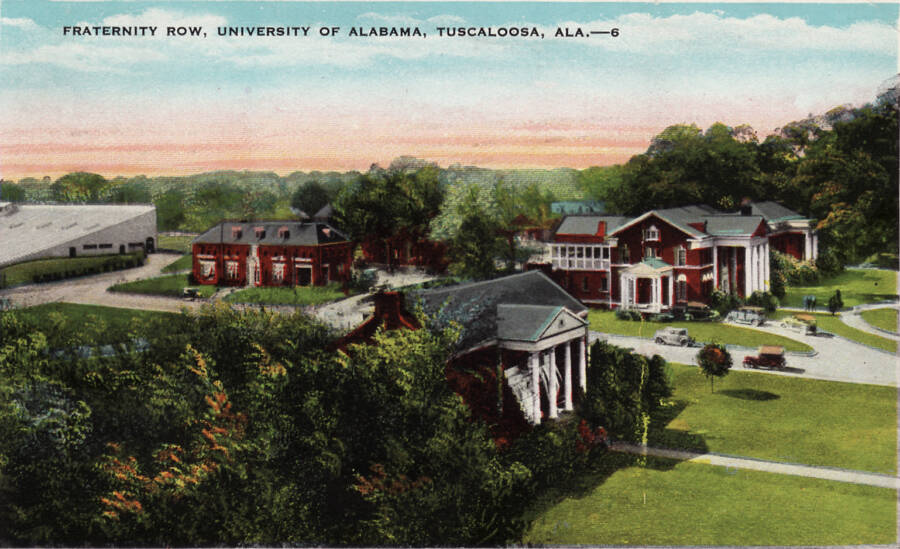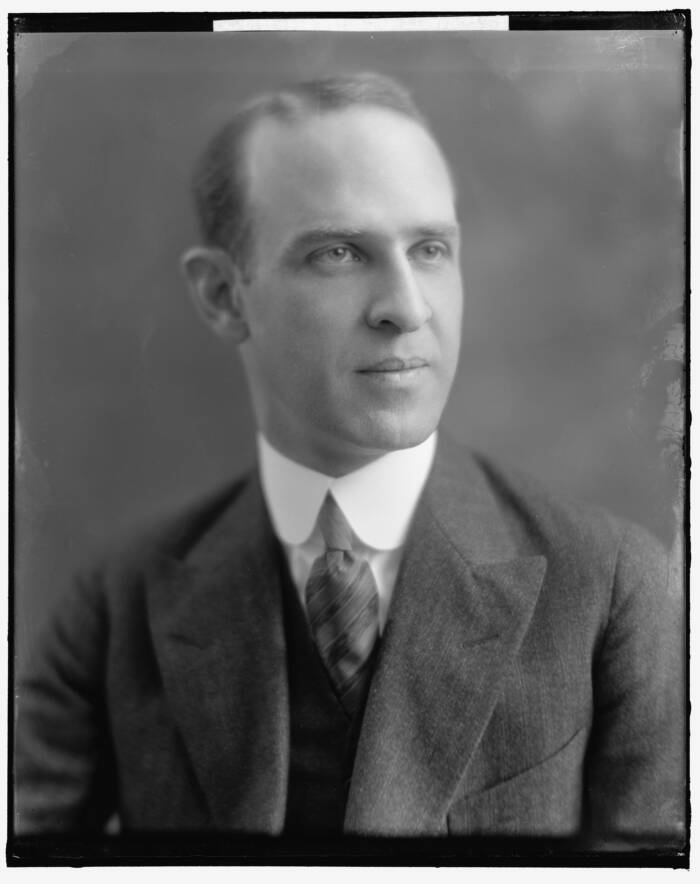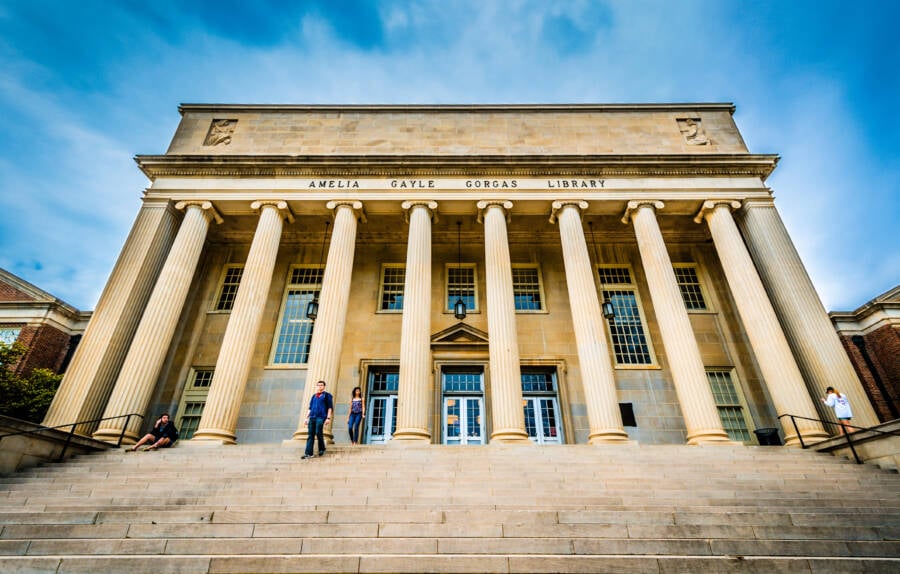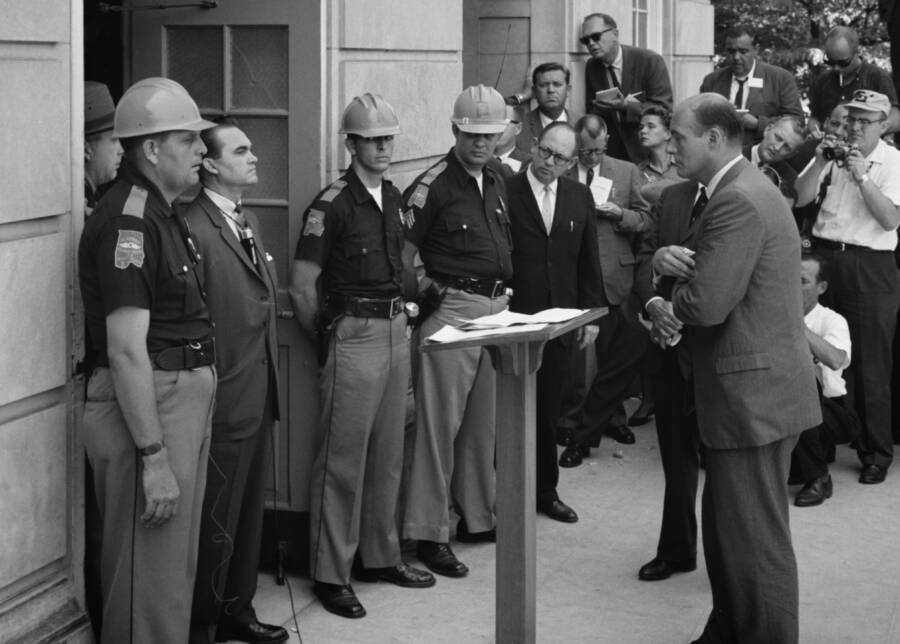For over a century, the underground organization known as The Machine has been covertly influencing everything from student government to Greek life at the University of Alabama.
The Machine at the University of Alabama is the school’s not-so-secret underground organization at the center of several shocking allegations. The society is reportedly made up of representatives from 28 of the university’s top sororities and fraternities.

Public DomainFraternity Row at the University of Alabama in 1943.
Since its inception in the early 20th century, The Machine has been rumored to control nearly all of the university’s affairs, from student government to Greek life. Some allege that its power has even extended beyond campus on occasion, impacting the outcomes of local elections.
The recent interest in videos detailing the University of Alabama’s sorority rush process on TikTok and the resulting Netflix documentary Bama Rush has called renewed attention to this century-old society. Now, critics are delving into the organization’s troubling past — and questioning how it’s still allowed to hold such influence.
This is the controversial history of The Machine at the University of Alabama.
The Origins And Early Days Of The Machine
In 1914, a University of Alabama student named Joseph Lister Hill established the school’s Student Government Association (SGA). He also founded a secret chapter of the fraternity Theta Nu Epsilon with the goal of controlling the SGA by covertly influencing who was elected — and thereby swaying decision-making on campus.

Public DomainJoseph Lister Hill, Alabama state senator and founder of The Machine.
According to a 1992 exposé about the group published in Esquire, the fraternity had an initiation ritual reminiscent of something from a Hollywood film:
“All Malachiks [candidates] should be brought into an outer or anteroom as they arrive at the place of initiation. As they enter, they should thrust their left hand into a bucket of blood (Mercurochrome).”
The president of the fraternity warned that if any member ever revealed its existence, the blood would reappear on their hands, “never to be removed.”
In its infancy, the organization was moderately successful at its mission. However, by 1945, the university’s newspaper, The Crimson White, had outed the secret society and given it a name that would forever stick: The Machine.
Despite losing its secrecy, The Machine continued to operate, steadily gaining influence as the decades passed.

Carmen K. Sisson / Cloudybright / Alamy Stock PhotoAmelia Gayle Gorgas Library at the University of Alabama.
Then, in 1976, the tides turned when Cleo Thomas beat the Machine-backed candidate and became the first Black SGA president in the University of Alabama’s history. Thomas got the votes he needed by appealing to the school’s Black students, independent students who were not affiliated with Greek life, and sorority members, who were routinely ignored by The Machine.
This event forced the secret society to involve women in its ranks to avoid losing its control over university politics. And from then on out, The Machine barreled through opposition.
Alarming Reports Of Assault And Election Meddling
In the 1980s, The Machine reportedly became increasingly more violent and malicious.
According to a 2020 report in The Crimson White, in 1983, the newly-elected SGA president John Bolus — who was not affiliated with a fraternity and had not been backed by The Machine — discovered that someone was tapping his phone. This event led to an investigation by the FBI.
Then, in 1986, a student named John Merrill beat The Machine to become SGA president. Before the election, however, he discovered two alleged members of the underground organization breaking into his office, and his wife reported receiving rape threats. What’s more, one of his campaign workers claimed that a car had tried to run him off the road on his way to campus one day.
Another disturbing event occurred in 1989 when Joey Viselli ran against The Machine’s candidate for SGA president. He didn’t win, but the race was too close for the secret society’s comfort. The Machine reportedly called for a boycott of the local pizza shop run by Viselli’s father. This resulted in the business receiving bomb threats, losing substantial revenue, and ultimately closing.
However, the most brutal attack came in 1993, when a non-Machine presidential candidate named Minda Riley suffered a ruthless assault.

The Greenville NewsA 1993 article in The Greenville News reporting on the assault of Minda Riley.
A masked man broke into her home and beat her so brutally that she was left with “a golf-ball-size bruise on her cheek, a busted lip and a knife wound on the side of her face,” her brother told The Crimson White at the time.
The attack prompted the university to suspend all student government activities for the next three years.
The Machine may also be responsible for manipulating local elections. In 2013, the Tuscaloosa News reported that The Machine allegedly meddled in a Board of Education election by promising free drinks and limo rides to polling sites for people who voted for Cason Kirby, a former Machine-backed SGA president. Kirby ultimately defeated the incumbent he was running against.
As University of Alabama professor Bill Stewart told the outlet, “Elections lost by the Machine are very few and far between.”
However, election meddling isn’t the only misdeed The Machine has been accused of.
The Machine At Alabama’s Concerning History Of Racism
The state of Alabama’s turbulent racial past is well documented in American history. During the Civil Rights Movement of the 1950s and ’60s, activists demonstrated in cities like Selma, Birmingham, and Montgomery to push for an end to Jim Crow laws in the state. The University of Alabama was even the site of a major historical event in 1963 when Governor George Wallace blocked the entrance to the school to prevent two Black students from entering.

Library of CongressAlabama Governor George Wallace attempts to block integration at the University of Alabama. 1963.
It is no surprise, then, that The Machine has also been accused of racism.
Following Cleo Thomas’ election as SGA president in 1976, there were reports of 15 men donning white robes, burning crosses on the lawns of the sorority houses, throwing bottles, and chanting for revolution.
Thomas later called the incident an “almost a benign act of terror,” saying, “It was so uncreative, at least to me.”
In 1986, a cross was burned outside of a house that the historically black sorority Alpha Kappa Alpha was hoping to use. The rumor at the time was that The Machine organized the incident as an intimidation tactic.
Then, in 1999, a Black candidate running for SGA president claimed that he received a threatening phone call. “What I vividly remember,” Fabien Zinga told CNN at the time, “is when he says, ‘We are going to hang you from the tree.'”
The underground organization also allegedly blocked a Black woman from receiving a bid to any of the school’s historically white sororities in the early 2000s. Melody Twilley had a high GPA, a wide variety of extracurricular activities, and several glowing letters of recommendation that should have earned her a spot in any of the sororities, but she was rejected from all 15 two years in a row. The Machine reportedly threatened the sororities with social banishment if they accepted Twilley.
But a few years later, things started to change.
The Shifting Tide Of The Machine At Alabama
In 2003, Gamma Phi became the first traditionally white sorority at the University of Alabama to offer a bid to a Black woman. According to a post from the The Crimson White, The Machine promised the sorority a spot in the society if they accepted a Black student in an attempt to dispel rumors that the organization was racist.
Then, in 2017, Jared Hunter became the first Black candidate for SGA president to be backed by The Machine. He won the election, marking a distinct shift in the culture of campus politics.

Instagram/@jared4sgapresJared Hunter was elected SGA president in 2017.
Hunter later expressed his hopes for the organization, telling The Crimson White in 2017:
“I wouldn’t be surprised if, in five to 10 years, The Machine that we see today is completely different. I’m not sure what it will look like. I think progress takes time and this year was the first step in making changes.”
Other students are not so sure The Machine is turning a new leaf, claiming that its actions are likely just a front to cover its sordid past and future ambitions.
Some SGA members insisted that the secret society was not genuine in its approach towards inclusion. Student senator Mike Smith claimed, “They don’t care about diversity, equality, or inclusion… [T]hey nominated a woman and a Black man back-to-back to regain control… I promise you the basement will throw up a White conservative Old Row fraternity guy for president next year.”
The Machine remains active on the University of Alabama’s campus to this day. In February 2023, a video reportedly captured a sorority member voting in an SGA election while using her phone to receive instructions on which candidates to select.
The video seemingly shows the member taking a screenshot of her vote as proof and sending it to an unknown email address, sparking rumors of retribution for sorority members who don’t choose Machine-backed candidates.
Given this evidence, it is clear that The Machine is alive and well at the University of Alabama, fulfilling its purpose as its founders intended. Whether it is truly attempting to march forward as an organization of integrity and inclusion is less certain.
After reading about The Machine at the University of Alabama, discover the secret history of the Skull and Bones Society at Yale University. Then, dive into the story of Adam Weishaupt, the man who founded the Illuminati.





